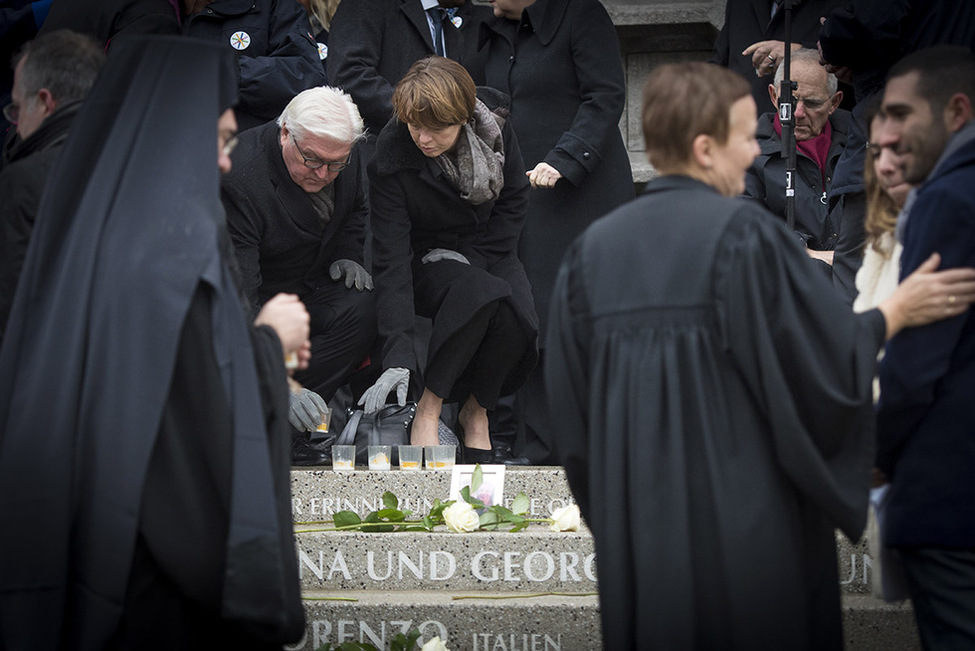It was silent on Breitscheidplatz the day after the attack.
This silence was not the solemn silence of Christmas Eve. It was the leaden silence that falls when words fail – when there are no words for the unfathomable.
I remember standing at the scene of the attack the morning afterwards, with a white rose in my hand, looking at the sea of flowers, the flickering candles. And in the middle of these flowers and candles was a sign painted by hand. It said just one word: Why?
None of us could answer that question. And to this day, the word why
continues to haunt us.
We mourn the loss of 12 people from Germany, Poland, the Czech Republic, Ukraine, Israel and Italy – men and women who lived in Berlin, were doing their job here or on holiday in the city. They were all brutally murdered here in the heart of this city, here in this place.
We think of the many people from all over the world who were injured in the attack, those who have still not found their way back to their old lives, who are still being treated for their injuries or will always need help.
We think of those who experienced the attack on the Christmas market, who feared for their lives and are unable to forget what they saw and heard.
We are grateful to all those who helped in the immediate aftermath of the attack and in the following weeks and months – the silent heroes who were there for the injured and bereaved, the police, paramedics, first aiders, aid organisations and Victims’ Commissioners.
We must also acknowledge that some support arrived late and was inadequate. Nevertheless, we want to thank those who provided help, those who feel for the victims, bereaved and injured to this day.
We share in the grief of the families and friends of the victims today – in your grief. A year ago, you lost a beloved person from one second to the next – a person with whom you had perhaps just spoken by telephone or had drunk some mulled wine, a person with whom you were planning to spend Christmas a few days later, a person with whom you had plans, in some cases lifelong plans.
We cannot grasp the depth of your suffering and we can only imagine your pain. And yet there is no doubt that very many people in Berlin, Germany and around the world share in your grief.
We want you to know that your experience, grievances and warnings do not fall on deaf ears. They leave no one in a position of responsibility in this country unmoved.
Politicians must not rush to say that there can be no perfect security in our open society, no matter how true this realisation is. We first need to state and recognise where avoidable mistakes were made. That is what must not leave us any peace. Our position must be that this attack should never have happened. And yes, it is a bitter blow that the state was unable to protect your families and friends.
That, too, is a wound that remains painful. And it admonishes us to keep asking ourselves the following question: are we really doing everything we can and must do in our democratic state governed by the rule of law to prevent terror attacks?
At any rate, the task left by 19 December 2016 for those responsible in politics is to examine the shortcomings and, where mistakes were made, to learn from them.
Many of the bereaved and injured – many of you – felt abandoned by the state after the attack, as you have said. For example, a mother whose daughter was killed said: No one was there for us all at the start.
These are words I cannot forget. The relatives’ joint plea must not simply fade away. It was a catalyst and has set something in motion.
Today we ask ourselves how we dealt with this watershed as a society, here in Berlin and all over Germany.
As early as the evening of the attack, people were saying: We’re not going to let ourselves be intimidated. We won’t sacrifice our freedom to fear. We’ll continue to live as before – now more than ever.
These sentences spread rapidly. They are powerful and they are right. But so shortly after the attack, when inconceivable violence had just exploded into our everyday lives, they no longer sounded merely defiant and self-confident, but also cold and too detached to the bereaved.
Continuing as before – the bereaved understood – seemed like a defence mechanism, like the all-too-rational attempt to suppress the shock rather than to endure it and take a step back in order to allow ourselves to feel the grief and inconsolable pain, and not only in private. And even if it was not meant that way, I am aware that the bereaved and injured could not understand this point of view because, as we all know, nothing has been the same for them for a year now.
It is true that we will not give in to terror. We will not allow ourselves to be restricted in our way of life. But that must not lead us to repress the pain and infinite suffering. We also stand up to terror when we gather to remember the victims and lend our support to the bereaved wherever possible.
Sharing our feelings of grief, rage and shock with each other and searching together for solace are also part of the unity we need to defend our freedom together.
I hope that you, the bereaved, can feel this unity and solidarity today, here in the Memorial Church, at Breitscheidplatz and all over Berlin. Your grief and disappointment, but particularly your hope, concern all of us.
I want to assure you that we will not leave you alone with all this.


